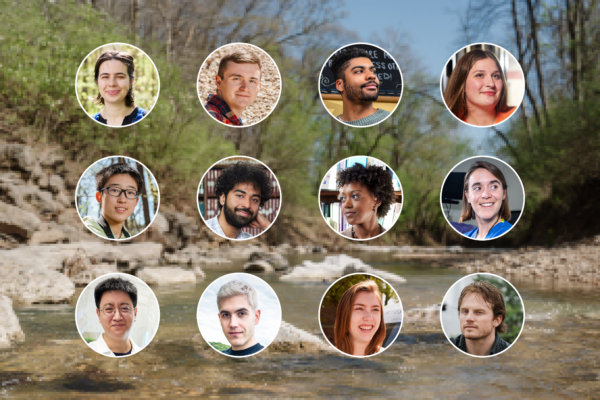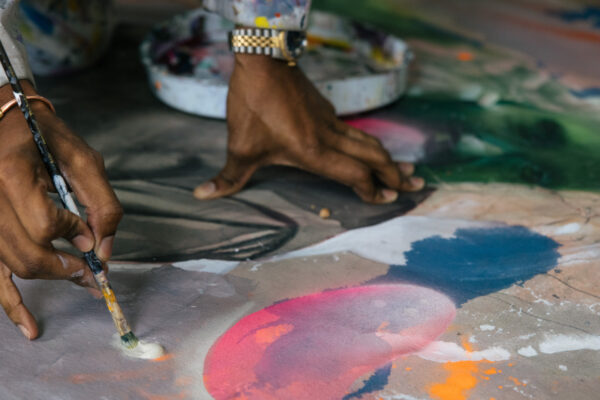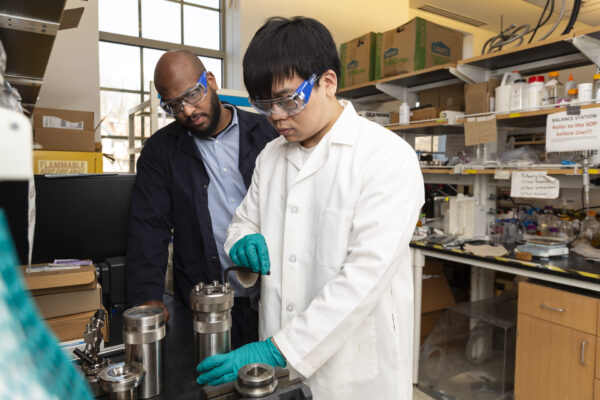
The sun goes down on a fall afternoon. A lone figure circles the remains of old experiments. She wears thick blue gloves. She is unperturbed by the howling wolves.
In her video performance “Circle At Dusk (Tyson Research Center, Eureka MO),” Sophia Hatzikos explores the complex relationships between natural and constructed systems and between scientific and artistic research practices. Hatzikos expects to earn in May a master’s degree of fine arts in visual art from the Sam Fox School of Design & Visual Arts at Washington University in St. Louis.
“It’s important to me to spend time in a place,” she said. At Tyson, a 2,000-acre environmental field station that WashU maintains a half-hour southwest of St. Louis, “I would set up the camera and move through the landscape. I like the idea of leaving a light footprint. Everything I touched was with those blue gloves.”
Blue — the color of the sky, of the ocean, of melancholy — figures prominently in Hatzikos’ work. Other recent projects include a series of works created on the Aegean coast; an installation made from a discarded agricultural pool; and a large mosaic, inspired by the motion of water, at WashU’s Mildred Lane Kemper Art Museum.
In this Q&A, Hatzikos, discusses her work, cross-disciplinary research and art in the time of climate change.
Before coming to WashU, you conducted interdisciplinary research and earned a bachelor’s degree in economics and visual art. What drew you to that mix?
I like researching, I like learning, I like talking with people. I really loved the lab! It took me a long time to acknowledge and claim the title of artist — because that does feel like a choice. (Other disciplines) have procedures and expected ways of being. Art didn’t have rules like that. There isn’t just one way to present things.
I tend to collaborate with people who are pushing their own fields. I think that’s where I’ve had the most success. Art is the way I like to research, but I’m still really interested in how economics shapes our decisions. I partnered with a biology professor who taught me how to make biomaterials with agar, pectin and collagen. I haven’t really said goodbye to any of them.

You won a Sam Fox School travel grant to the coastal town of Malaki, Greece. The resulting body of work includes an ocean performance documented by drone and trompe-l’oeil sculptures resembling sea urchins and discarded brick. What was your process like?
I researched by swimming! I swam for miles along the shoreline. The sea is an interesting place for waste … . There’s an amazing amount of detritus because disposal is so expensive. Not everything is a relic. You find refrigerators.
I would dive and collect objects, which I’d then recreate and reinterpret from memory. I would love to be able to take a 3D scan and not remove anything from the site. I came to this realization that artifacts are too factual. I wanted to create a little fiction, a little lore.

What role can art play in addressing ecological crisis?
A lot of my practice is about embedding myself within physical environments. As environmental calamity increases, I think we’re going to face a lot of loss and a lot of sadness. We’re not going to have answers. The question of why something happens can’t always be met with data.
But there’s something potent about approaching the ecological conversation from a personal lens. Sharing narratives, sharing stories, interacting with people along the way … I think those things are helpful. They remind us that there are many ways of being with nature.


